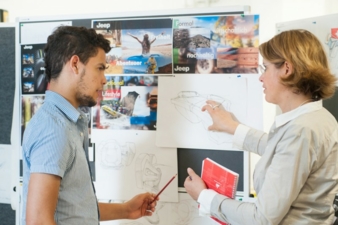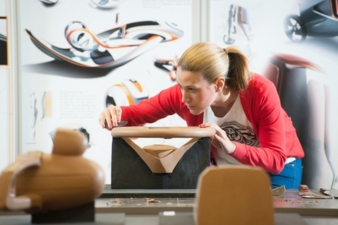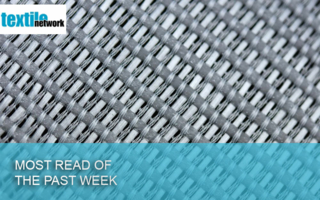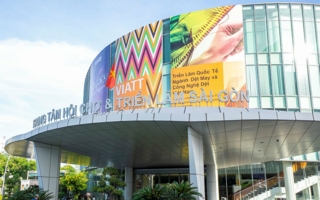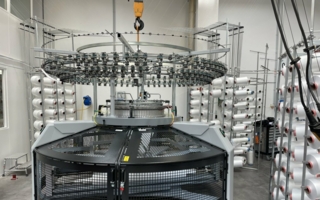26/08/2015 — auf Deutsch lesen
Designing vehicle interiors
In the 'Transportation Interior Design' course at Reutlingen in south west Germany, students design interior spaces for cars, buses and aircraft. What does the car of 2050 look like? It has telescopic and rotating elements. Seats can be transformed into tables and everything is controlled via a touch-screen display. The seats, which conveniently adapt to the shape of the body, can rotate and retract. In this view of the future, the interior can even be equipped with special sensors that measure the driver's vital functions.
It has been designed by students at Reutlingen University. For the 'Transportation Interior Design’ course, the young people develop designs for cars, buses and aircraft – from conception to practical implementation. Basing their work on well-founded research, they develop three-dimensional colour designs in appropriate materials. At the end of the course, they present their design work and show how it has been derived using animations that they have created themselves.
Over seven semesters, the students learn a great deal about the effects of different shapes and materials, and about what dashboards and car seats should look like in order to be both functional and comfortable to use. Where should fabric be used; where plastics; where leather? How do colours affect a driver? How can ideas be represented in three dimensions? And what shapes and designs are appropriate to what makes of car? The students find answers to all these questions – through lectures, exercises, workshops and, of course, in the semester they spend on placement in the industry.
“The Transportation Interior Design course is aimed at potential students who, as well as being creative, take pleasure in working with shapes and materials,“ explains the Dean of Studies, Prof. Andrea Lipp. “They need to have a degree of technical understanding,“ she continues, “and to see themselves in the future as part of a development team in the vehicles and automotive sector.“ Team-building, she says, is also particularly important on this course, as designers in industry are always part of a team and seldom work alone.
Another plus point for Reutlingen: small teams make it possible to offer the students personal support. "The course gave me a great entry into working life," says former student Helena Sophie Wagner in a positive endorsement. Today she works as a designer at Bugatti in Wolfsburg.
Reutlingen University is one of the leading universities to offer an international academic education while colluding closely with business. It currently has 5800 young men and women studying in its five faculties and offers a range of 43 Bachelor's and Master's courses. Its Reutlingen location, in the heart of Germany's car industry, is a short distance from Porsche, Daimler-Benz and Smart and has strong links with Audi and BMW. These companies make a significant contribution to course content, ensuring that it remains in tune with the industry’s needs.

